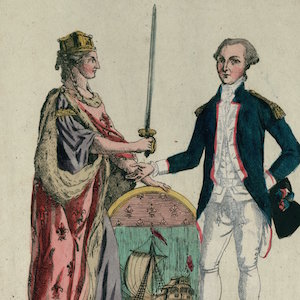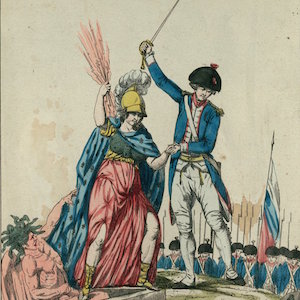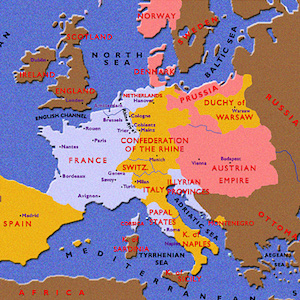Europe

Lafayette Receives the City’s 'Sword for the Defense of Liberty'
During the Revolution the most visible connection between America and France was Lafayette, who had volunteered for service in the American Revolution and had been mentored by Washington and Jefferson.

The French Nation Defeats Despotism
Here Lafayette’s role is praised. A warlike liberty stands with him over a defeated despotism at his feet. Revolutionaries often represented despotism as a multi-headed monster.

The Marseillaise
A similar emphasis on patriotic unity can be seen in Jean Renoir’s film, La Marseillaise (1938). The movie tells the story of France’s national anthem, composed by Rouget de Lisle as a way to rally the troops. The song, written for soldiers from Marseillaise, soon inspired the entire nation.

Burning the Guardhouse on the Pont Neuf
This retrospective shows that early in the French Revolution targets were often economic. This should be no surprise as the populace had a long tradition of taking the law into its own hands to rectify what they saw as injustices.

Departments of 1798
Map of 1798 France depicting the Departments and major urban centers.
This source is a part of the The Napoleonic Experience teaching module.

Map of Europe in 1812
A map of Europe in 1812 depicting French territory, French dependencies, and territories allied to Napoleonic France.
This source is a part of the The Napoleonic Experience teaching module.

Map of Europe in 1815
A map of Europe in 1815 depicting Napoleonic France, Prussia, the Austrian Empire, and the boundary of the Germanic Confederation.

Napoleon in Italy 1796-97
Map depicting Napoleon's campaigns in Italy, 1796-97.
This source is a part of the The Napoleonic Experience teaching module.

Napoleon’s Egyptian Campaign
Map depicting Napoleon's Egyptian campaigns.
This source is a part of the The Napoleonic Experience teaching module.

The Moscow Campaign 1812
Map depicting Napoleon's 1812 Russia campaign.
This source is a part of the The Napoleonic Experience teaching module.